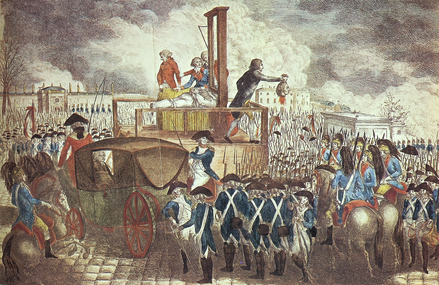EXECUTION OF LOUIS XVI
|
The French Revolution was a major event in the history of Western societies, and has had a profound effect on the world today. Beginning in 1789, the French Revolution saw the French people overthrow their absolute monarchy and bring about a republic that was based on the principles of equality, liberty and fraternity. A major result of the French Revolution was the execution of Louis XVI, the monarch of France during the revolution.
Louis XVI became the king of France in 1774 when he succeeded his grandfather, Louis XV. However, Louis XVI struggled to lead France and lacked the qualities of previous monarchs. For example, Louis XVI was known to be shy and indecisive. Throughout the 1780’s France, and the peasants in particular, struggled due to economic hardships and poor harvests. Louis XVI famously mismanaged the country with his indecisiveness as it slipped into crisis and by 1789 he had lost the respect of his people. Ultimately, this led to his downfall, as the people began to seek different forms of government and rejected the traditions of feudalism and monarchy. |
While the early stages of the revolution were carried out by the moderates in the National Assembly and the Legislative Assembly, by 1792 it was firmly in the hands of the more radical National Convention. It was around this time, that Louis XVI and his family were imprisoned in the Tuileries Palace in Paris following the march of Parisian women to Versailles. However, the royal family soon attempted to break free from their imprisonment. On the night of June 20th, 1791, Louis XVI, Marie Antoinette and their children snuck out of the palace in Paris disguised as servants and took a carriage through the French countryside towards France’s border with Austria. When the carriage arrived in the small French town of Varennes, it was stopped by a town official and the royal family was recognized. The revolutionaries forced Louis XVI and his family to return to Paris and removed the little remaining authority the king still had. Louis XVI was, from that point on, viewed as a traitor to the revolution and imprisoned again in Paris. Louis’ attempt to flee would prove to be important as it would be the deciding factor in the National Convention’s decision to convict and execute the king.
|
Soon, the representatives of the National Convention moved to put Louis XVI on trial. On December 11th, 1792, the king was brought before the convention to hear the charges against him. He was charged with treason due to his attempt to flee the country, which was viewed as him abandoning his country. Next, on January 15th, 1793, the representatives voted and passed their verdict of guilty. The famous revolutionary, Maximilien Robespierre, commented that “Louis must die so the nation may live.” Louis’ punishment was death and on, January 21st, 1793, he was beheaded by guillotine. His final words were said to be: “I pardon those who are the cause of my death and declare myself innocent of all of the charges brought against me.” The French monarchy, which had lasted for over 1000 years was over.
|
CITE THIS ARTICLEAUTHOR
|
|


